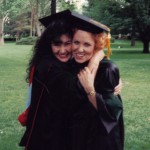Loan repayment program boosts health workforce
Posted: May 23, 2013
A grant funded by the United Health Foundation is helping ATSU graduates take their mind off tuition, allowing them to focus on what really matters—providing quality healthcare to patients, especially patients in underserved communities.
Established in 2009 with a $100,000 grant from the United Health Foundation, the Connect the Docs Graduate Loanship Program started by providing loan repayments to two qualifying ASDOH graduates who secured jobs in community health centers. Inaugural recipients Elizabeth Magallanes, DMD, ’09, and Brenden Davis, DMD, MPH, ’09, each received $25,000 to repay his or her student loan at the end of each year for two years.
“I think this is a wonderful way to get dentists into underserved communities, especially if graduating students know early on that this funding would be available if they choose employment at an underserved site,” Dr. Davis said.
Today, the program has grown to include primary care loan repayments for KCOM graduates as well. To date, the United Health Foundation has provided a total of $400,000 to eight recipients including six dentists and two primary care providers.
KCOM’s inaugural recipients include 1994 graduates and friends Joyce Scott, DO, and Norma Cavazos-Salas, DO. Dr. Scott practices alone in Celina, Tenn., and Dr. Cavazos-Salas practices in Mission, Texas, both underserved communities.
“The loan repayment program is a win-win for everyone involved,” said Kate Rubin, United Health Foundation president. “By helping alleviate medical school and dental school debt, health professionals can invest their talents and passion in the underserved communities that need them most. Providing critical medical and dental services to populations that have historically had limited access to care is a true game changer.”
ASDOH Dean Jack Dillenberg, DDS, MPH, feels that the program is a tangible expression of the School’s model of social innovation, which blends quality education with an unflinching commitment to community service.
“Society is getting a benefit beyond care for their teeth,” he said. “They are getting the benefit of understanding the whole person health concept.”
Said KCOM Dean Margaret Wilson, DO, ’82, “The expansion to include KCOM has been a tremendous chance to help our graduates who are working with underserved patient populations. We are so fortunate and grateful to have this support.”